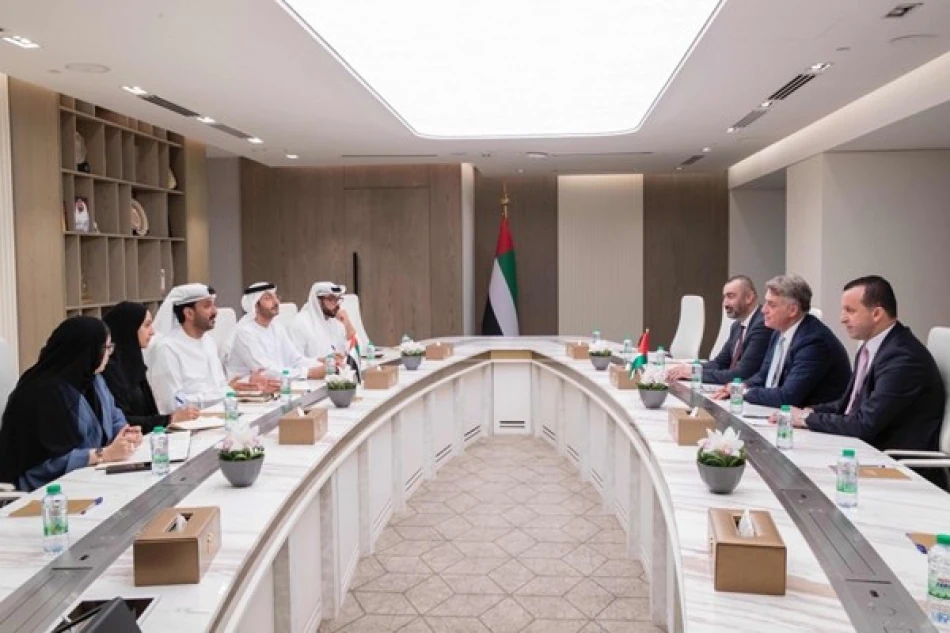
Palestinian Economy and Tourism Minister Discusses Enhancing Cooperation with Central Bank Governor
UAE Shares Anti-Money Laundering Expertise with Palestine in Strategic Partnership Move
The UAE is positioning itself as a regional leader in financial crime prevention by offering to share its internationally recognized anti-money laundering framework with Palestinian authorities. This cooperation signals Abu Dhabi's growing confidence in its regulatory systems and its broader strategy to strengthen economic ties across the Middle East following recent diplomatic normalization efforts.
High-Level Diplomatic Engagement Focuses on Financial Security
UAE Minister of Economy and Tourism Abdullah bin Touq Al Marri met with Palestinian Monetary Authority Governor Yahya Shannar in Abu Dhabi to discuss enhanced cooperation in economic and developmental policies. The meeting, attended by UAE Assistant Undersecretary for Commercial Supervision and Governance Safia Al Safi, centered on combating financial crimes and sharing regulatory best practices.
The discussions covered emerging global trends in financial crime prevention and the risks that money laundering practices pose to economic stability and financial sector integrity. Both officials emphasized the need for proactive measures to address evolving patterns of financial crimes.
UAE's Regulatory Success Story Offers Blueprint for Regional Partners
International Recognition Validates UAE Approach
The UAE's anti-money laundering credentials have received significant international validation in recent years. The country was removed from the Financial Action Task Force (FATF) enhanced monitoring list and subsequently from the European Parliament's high-risk third countries list for money laundering and terrorism financing.
This regulatory success represents a dramatic transformation for the UAE, which had faced international scrutiny over its financial oversight mechanisms just a few years ago. The country's removal from these watchlists has enhanced its reputation as a safe, stable, and competitive economy.
Digital Infrastructure as Competitive Advantage
Central to the UAE's approach is the National Economic Registry project "Numu," which has created the largest digital database of unified and reliable information for all commercial licenses of establishments and companies in the country. This system standardizes beneficial ownership procedures in line with international standards and enhances oversight capabilities.
The platform monitors designated non-financial businesses and professions, including real estate intermediaries and agents, precious metals dealers, independent accountants and auditors, and corporate service providers. This comprehensive approach demonstrates how digital transformation can strengthen regulatory oversight.
Strategic Implications for Regional Financial Integration
Economic Diplomacy Through Regulatory Cooperation
The UAE's willingness to share its regulatory expertise with Palestinian authorities reflects a broader strategy of economic diplomacy. By positioning itself as a knowledge hub for financial regulation, the UAE strengthens its soft power influence while building practical partnerships that could facilitate future trade and investment flows.
This cooperation model mirrors similar initiatives by financial centers like Singapore and Hong Kong, which have used regulatory expertise sharing as a tool for regional integration and influence building.
Market Implications for Financial Services Sector
For financial institutions operating in the region, this cooperation could lead to more standardized regulatory approaches, potentially reducing compliance costs and operational complexity. Banks and fintech companies may benefit from clearer, more aligned regulatory frameworks across different jurisdictions.
The focus on training programs for human resources in financial crime prevention also suggests a regional push toward building specialized expertise, which could create new opportunities for professional services firms and training providers.
Building Institutional Capacity Through Knowledge Transfer
Both parties committed to enhancing cooperation through the exchange of latest expertise regarding regulatory and supervisory practices and procedures adopted internationally in combating money laundering. The emphasis on training programs for relevant human resources ensures that work teams are prepared to deal proactively with changing patterns of financial crimes.
This institutional capacity building approach recognizes that effective financial crime prevention requires not just strong laws and systems, but also skilled personnel capable of adapting to evolving threats. The commitment to ongoing knowledge exchange suggests a long-term partnership that could serve as a model for other regional cooperation initiatives.
The collaboration ultimately aims to protect financial integrity and enhance confidence in both countries' economic systems, contributing to broader regional financial stability and integration efforts.
Most Viewed News

 Layla Al Mansoori
Layla Al Mansoori






